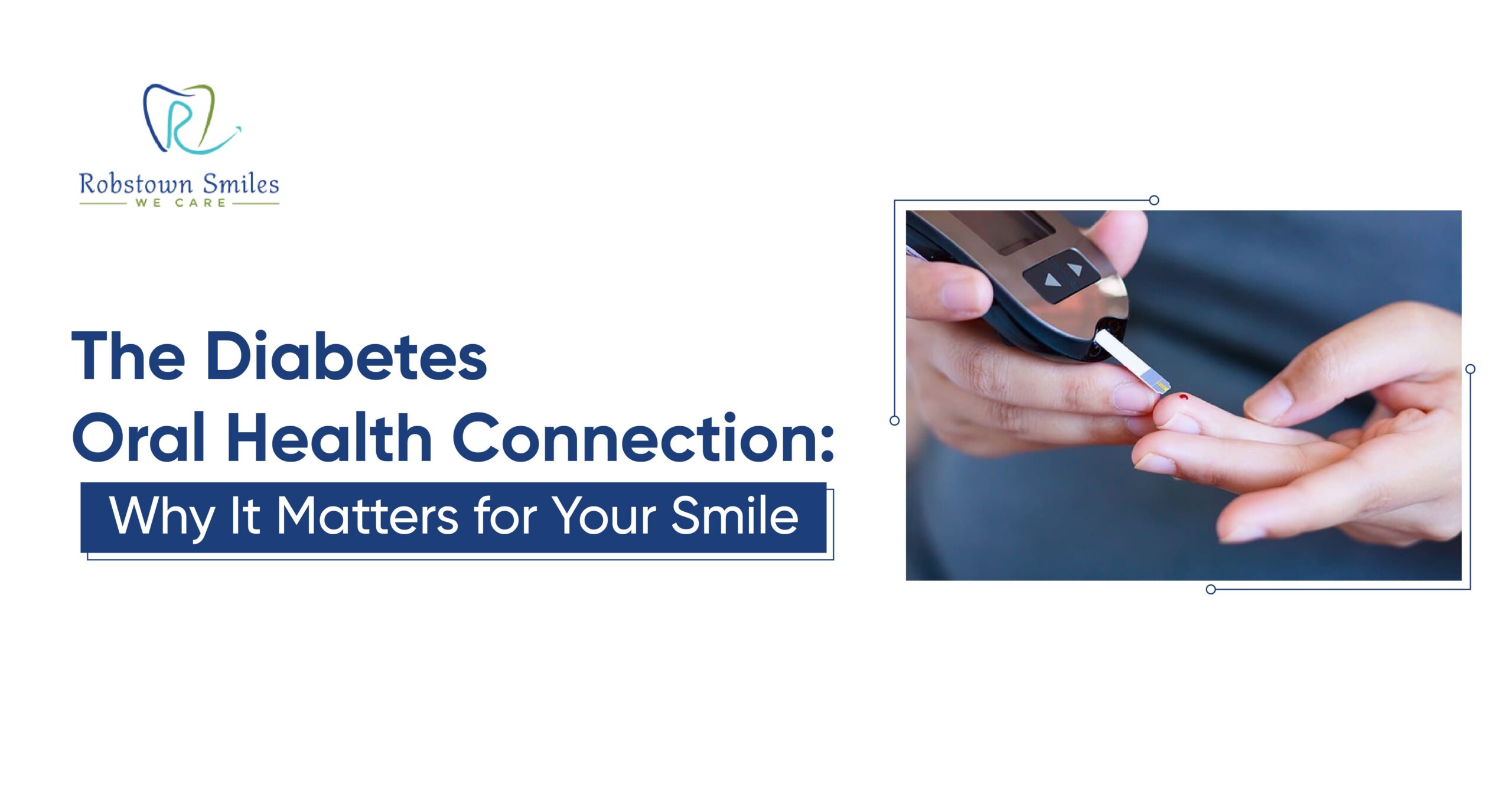At Robstown Smiles, we believe that oral health is the foundation of your overall health. Most people know the basics of oral hygiene: brushing, flossing, and regular dental visits. But there is one critical link that often flies under the radar: diabetes and oral health. If you have diabetes or are at risk, knowing about this link can help you to better care for both your smile and your health.
What is the relationship between diabetes and oral health?
In short, diabetes, whether type 1 or type 2, impacts the management of blood sugar in the human body. Blood sugar levels can damage several organs, tissues, and systems in the body over time; your gums and teeth aren’t exceptions. Oral complications are a common risk of diabetes; therefore, diabetes has to be managed along with oral hygiene habits.
Key Oral Health Issues Tied to Diabetes
Periodontal or Gum Disease
Gum disease is one of the most prevalent and serious oral health conditions for people who have diabetes. High levels of glucose in the bloodstream weaken the body’s ability to fight infection, and its capacity for the multiplication of bacteria is increased in the mouth. This leads to inflammation and swelling of the gums as well as to infection of the gums in the form of gingivitis, which can gradually develop into more severe forms of periodontal disease. This can make it harder to control blood sugar, creating a cycle. In fact, some research has shown that treating gum disease improves control of diabetes-related blood sugar levels.
Dry Mouth (Xerostomia)
People with diabetes often suffer from a disease referred to as dry mouth, a condition which is brought about by dehydration of the mouth through lack of saliva. Higher levels of blood glucose make one lose water in his body which in turn slows down salivation. Saliva eliminates acids that eat away our teeth and facilitates the exit of other foreign particles causing tooth decay. The lack of enough saliva increases risks of suffering cavities and gum disease.
Tooth Decay
High blood sugar also encourages your mouth being more acid that facilitates the living of the bacteria and the plaque thereby resulting in high cavities incidences and generally on condition that blood sugar cannot be well regulated. A second infection more likely associated with diabetic individuals is the fungal infection that might hit on the gum, cheek and even tongue.
Oral Cavity Healing Slows DOWN
High blood sugar can suppress the body’s healing ability. This implies that mouth injuries, such as a cut in the mouth, dental procedures, or even just a sore, may take longer to heal in diabetic persons. This leads to infections and other complications of the mouth.
Bad Breath (Halitosis)
Uncontrolled diabetes contributes to the cause of constant bad breath, usually linked to dry mouth or extremely high blood sugar. Presumably, the bacteria content in the mouth with fewer salivations causes it to be sour or have a fruity smell, usually always associated with diabetes.
Practice Good Oral Hygiene Management with Diabetes
There should be a combination of good oral hygiene and effective diabetes management in order to manage the diabetes and keep your mouth healthy. Here are a few tips that can help in maintaining a healthy smile by controlling your blood sugar level:
Keeping your blood sugar at a level that your doctor prescribes is one of the most important steps you can take to protect your oral health. Consistently high blood sugar levels lead to many of the oral health problems associated with diabetes.
Brush and floss regularly
Brush your teeth at least twice a day with fluoride toothpaste, and floss once every day. This helps get rid of the plaque-the sticky film of bacteria which causes gum disease and rotting of the teeth. For a diabetic patient, this may require them to be more observant in their brushing and flossing.
Drink Sufficient Amounts of Water
Drink plenty of water to keep your mouth moist and prevent dry mouth. If you have chronic dry mouth, consult your dentist for saliva substitutes or special mouth rinses that can be helpful.
Visit Your Dentist Regularly
Dental visits for check-ups help in avoiding and identifying some issues concerning the oral health condition very early. In Robstown Smiles, it is commonly recommended that the diabetic patient visits his or her dentist at least every 6 months if it is not causing any problem sometimes within the shorter periods. During dental visitation, he can detect the presence of marks showing gum diseases and the decays of teeth and even some other disorders associated with oral health.
Quit Smoking
The foremost risk factor of gum disease is smoking. Smoking contributes to the complexity of control over diabetes for people afflicted by the disease. If you smoke, quitting can better oral health and general health.
Be on the Lookout for Symptoms
Be aware of signs and symptoms of gum disease and other oral conditions, which include red, inflamed, or bleeding gums, constant bad breath, dryness in the mouth, and pain while chewing. Immediately visit your dentist if any of these appear.
Conclusion
Your oral health depends on your blood sugar. If you are a sufferer of diabetes, it is even more crucial to keep your oral health on par. Proper control of your blood sugar level and good oral hygiene may reduce the danger of more serious dental problems arising. Regular visits to the dentist, along with homecare, will help you maintain that sparkling smile and help regulate your diabetes.
At Robstown Smiles – we can offer full support, even to dental patients afflicted with such various health diseases as diabetes mellitus or even have general concerns and oral disease issues. Now is your schedule for scheduling a consultation and let’s keep you all smiling – your whole well-being!

